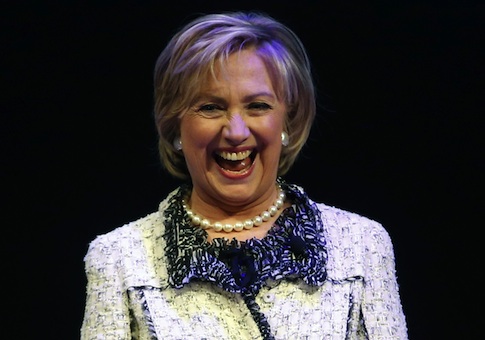The current political climate among Democrats leaves Hillary Clinton with a 'rickety bridge' to the White House in 2016, according to Financial Times columnist Edward Luce.
The biggest problem for Clinton, according to Luce, is that the left simply is running short on good ideas to sell the public, and that the Democratic voting base has lost the faith in liberalism that it had when it elected President Barack Obama in 2008.
Though the demographics of a national election are widely believed to put Democrats at an advantage, there is a lot for Clinton to overcome, Luce writes.
Come the glamour of 2016, Hispanic, millennial, single female and African American voters will be back in force. All that Hillary Clinton need do–or whoever takes the Democratic nomination–is tick the right boxes and let demography fix the rest.
Such is the US left’s world view. It is also a measure of its intellectual poverty. Whatever liberals are smoking, it is no stimulant to new ideas. The left’s sense of destiny is based on America’s shift to a minority-majority nation within the next 30 years. As the white vote shrinks, each presidential race will be harder for Republicans to win. What is missing is a compelling reason for people to embrace Democrats, as opposed to rejecting Republicans. For the time being, the latter can be relied upon to offend minorities–notably Hispanics. But Democrats have remarkably little new to say about the future of America’s middle classes, regardless of ethnicity.
Luce adds that Clinton will be unable to use the popular anti-Wall Street populist message that has worked for Sen. Elizabeth Warren (D., Mass.) because of her financial sector donors.
Mrs Clinton’s network of donors are comfortable with social liberalism. The bulk of her money will come from places like Wall Street and Silicon Valley, which are either neutral or supportive on social issues. Their focus is on lower taxes and fewer regulations. Mrs Clinton’s challenge will be to square her donors’ priorities with America’s increasingly apolitical young voter. A large slice of millenials likes to spliff up. Many are gay and non-white. But that does not automatically make them Democrats. Those who are unemployed want jobs. Those who have jobs want a pay rise. All that most will remember is eight lean years under President Barack Obama.
Mrs Clinton faces two problems in igniting their passion. First, Mr Obama has lost the faith of the liberal base. Much of what remains has been captured by Elizabeth Warren, the senator from Massachusetts, who insists she has no intention of taking on Mrs Clinton.
Mrs Warren’s message is anti-Wall Street. It resonates with the party’s grassroots – and probably most of its grass consumers too. Her populism puts Mrs Clinton in a bind. She would have a hard time co-opting Mrs Warren’s language without alienating her financial backers. Yet she must also find a new generation of economic advisers.
